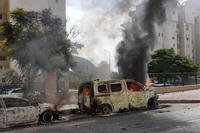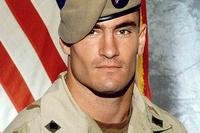The U.S. braced for more violence at State Department posts across a wide swath of the planet from Lagos to Djakarta Thursday, with the main focus on the Mideast and a planned “million man” march on the U.S. Embassy in Cairo on Friday promoted by militants with possible links to Al Qaeda.
Military planners were “reviewing our force posture in the region” to respond to threats “given the potential for further protests coming” in a climate of anti-U.S. rage, said George Little, the Pentagon’s chief spokesman.
“Our assets in the region are prepared to respond to any contingency,” including three Navy Aegis destroyers armed with cruise missiles in the Gulf of Sirte off Libya, Little said. He declined comment on whether surveillance drones were also being deployed to assist in tracking potential suspects.
The military was also “working closely with the FBI,” which sent teams to Tripoli, Libya, to track the extremists believed responsible for the attacks on the U.S. consulate in Benghazi Tuesday that killed Ambassador Chris Stevens, Foreign Service Officer Sean Smith and two other State Department personnel, Little said.
The other victims have been identified by the State Department as Glen Doherty, 42, of Winchester, Mass., and Tyrone S. Woods. Both are former Navy SEALs who were providing security for U.S. officials.
The demonstration that turned violent in Benghazi, and a similar protest on Tuesday in which rioters scaled the walls of the U.S. Embassy in Cairo, were triggered by an anti-Islamic video mocking the Prophet Mohammed that was made in the U.S., although the protests also fell on the 11th anniversary of the 9/11 attacks.
The origins of the video were murky, but it has been promoted by the Rev. Terry Jones, a fundamentalist Florida preacher who has previously ignited deadly demonstrations in Afghanistan with threats to burn the Koran.
“This video is disgusting and reprehensible,” Secretary of State Hillary Clinton said at the State Department Wednesday. “The U.S. government had absolutely nothing to do with this video,” but demonstrations were renewed for a third day in Cairo and other posts around the world.
In the Yemeni capital of Sanaa, protesters breached the outer rings of the heavily-fortified U.S. Embassy before being turned back by Yemeni security forces firing teargas and firing in the air. “Not our Prophet. He is a red line,” the demonstrators shouted, according to news agency reports.
In Lagos, Nigeria, police were on “red alert” to ensure “24-hour water-tight security in and around all embassies and foreign missions,” a police spokesman told local newspapers.
“What happened is unacceptable, rejected, Bloomberg News quoted Mr. Morsi as saying. “The Prophet Muhammad taught us to respect human life.” But he also warned against maligning Islam’s founding prophet. “The Prophet Muhammad and Islamic sanctities are red lines for all of us.”
In Jakarta, Indonesia, government officials demanded that YouTube block the anti-Islamic video to prevent it from being seen in the world’s most populous Muslim nation, and Afghanistan’s President Hamid Karzai made similar moves to keep the video off the local Internet.
Karzai also cancelled a visit to Norway to monitor events at home. "The reason is that the President, in light of the serious events in some Arab countries in the past day, sees a need to be in Afghanistan," the Norwegian Foreign Ministry said in a statement.
In Cairo, the U.S. Embassy was closed and all visa appointments were cancelled “in the interests of safety” ahead of the mass demonstration planned for Friday.
The 90,000 Americans who live and work in Egypt were told to “avoid areas where large gatherings may occur. Even demonstrations or events intended to be peaceful can turn confrontational and possibly escalate into violence. U.S. citizens in Egypt are urged to monitor local news reports and to plan their activities accordingly,” the Embassy said in a statement.
The demonstration was being backed by leaders of several Islamic movements, including Mohammad al-Zawahiri, according to Egyptian media reports. He is the younger brother of Ayman al-Zawahiri; the long-time No. 2 to Osama Bin Laden and now the leader of Al Qaeda.
Several sons of Sheikh Omar Abdel Rahman, the radical cleric now jailed in the U.S. for involvement in the first attack on the World Trade Center in 1993, were also supporting the protests against the video.
On a visit to the European Union in Brussels, Egypt’s President Mohammed Morsi, who is backed by the Muslim Brotherhood, condemned the attacks in Benghazi but also called on President Obama to ban the anti-Islam video.
Morsi said Obama should “put an end to such behavior, but at the same time we say this cannot be taken as a justification for attacking embassies or consulates."
In previous periods of unrest in Egypt, Defense Secretary Leon Panetta has been quick to call the military leadership in Egypt to assure stability, but “the Secretary has not called his Egyptian counterparts” during the current crisis, Pentagon spokesman Little said.
Little also declined to refer to Egypt as an “ally,” signaling the current chill in the relationship between Washington and Cairo. Little said Egypt was a “strategic partner,” and not an ally, since “ally is a legal term of art, and we do not have a defense treaty with Egypt.”
Little also rejected rumors that the Marines on guard at the Cairo Embassy had been ordered not to carry ammunition along with their weapons. “The Marines do in fact have weapons,” Little said, “and I’ve heard nothing to suggest they don’t have ammunition.”





























